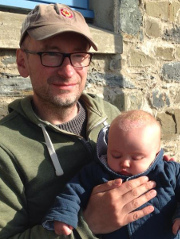This time, we have the privilege of talking to John Collins (University of East Anglia) as we shift our attention to the human language faculty. Click here to listen to our conversation.
 Human beings are the only animal in the world that can natively acquire a language like English, French, Czech, Nahuatl, Yoruba, or Tamil. Take any baby, raise it among caretakers who speak language X, and it will arrive at perfect native mastery of X as early as age 7. If you try the same experiment with a baby walrus or even a baby chimp, you’ll find the results are way less impressive. This is because the human mind has some intrinsic features that enable it to learn languages by osmosis, as it were, in this intuitive manner.
Human beings are the only animal in the world that can natively acquire a language like English, French, Czech, Nahuatl, Yoruba, or Tamil. Take any baby, raise it among caretakers who speak language X, and it will arrive at perfect native mastery of X as early as age 7. If you try the same experiment with a baby walrus or even a baby chimp, you’ll find the results are way less impressive. This is because the human mind has some intrinsic features that enable it to learn languages by osmosis, as it were, in this intuitive manner.
The big idea behind Noam Chomsky’s theory of universal grammar, which has since turned into a massive research program among professional linguists, was that we humans have the ability to natively acquire languages because nature has given us a head start. The languages of the world are quite varied in the number of words they have, the sounds the words are made of, and the rules for putting words together, but there are also way, way more variations that we never see, even though there’s no reason in principle that we shouldn’t ever see them.
Join us as our guest walks us through some of these astonishing features that all languages seem to have, and which every child just automatically assumes that they have, without having to learn anything.
Matt Teichman
Leave a Reply to Daniel W. Hieber Cancel reply